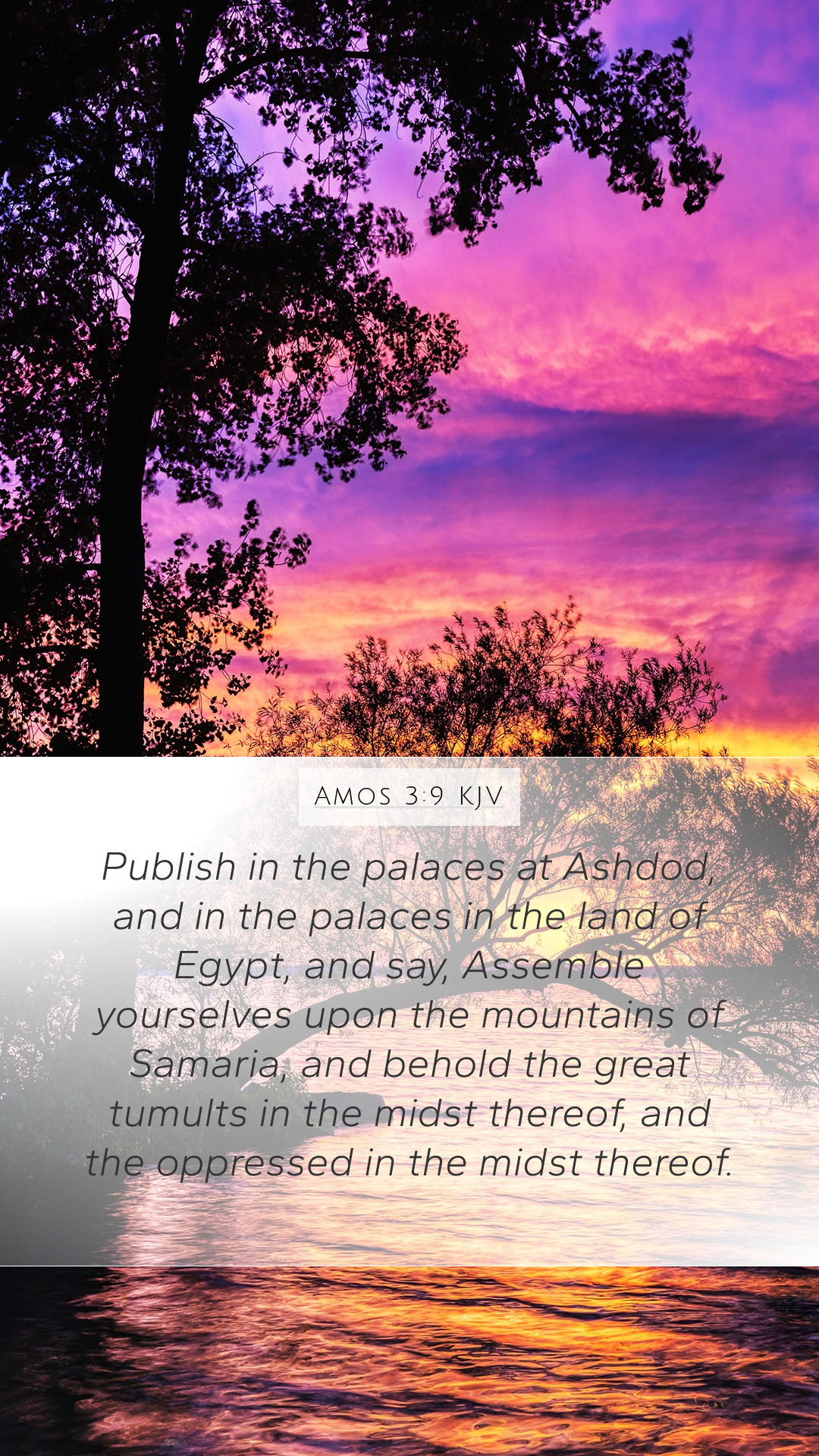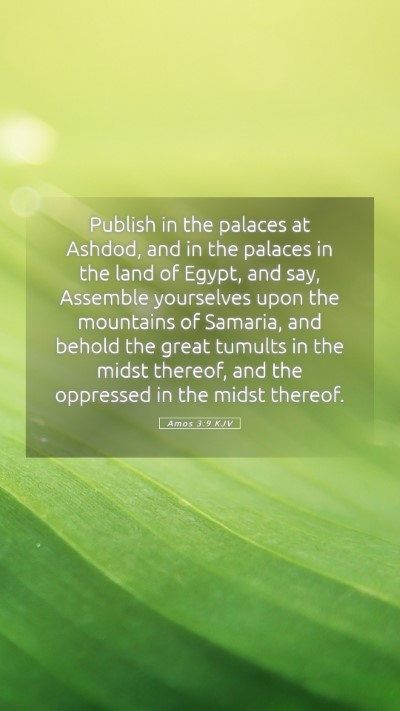Old Testament
Genesis Exodus Leviticus Numbers Deuteronomy Joshua Judges Ruth 1 Samuel 2 Samuel 1 Kings 2 Kings 1 Chronicles 2 Chronicles Ezra Nehemiah Esther Job Psalms Proverbs Ecclesiastes Song of Solomon Isaiah Jeremiah Lamentations Ezekiel Daniel Hosea Joel Amos Obadiah Jonah Micah Nahum Habakkuk Zephaniah Haggai Zechariah MalachiAmos 3:9 Meaning
What is the meaning of Amos 3:9?
Publish in the palaces at Ashdod, and in the palaces in the land of Egypt, and say, Assemble yourselves upon the mountains of Samaria, and behold the great tumults in the midst thereof, and the oppressed in the midst thereof.
Amos 3:9 Bible Verse Meaning
Understanding Amos 3:9
The verse Amos 3:9 states: "Publish in the palaces at Ashdod and in the palaces in the land of Egypt, and say, 'Assemble yourselves upon the mountains of Samaria, and behold the great tumults in the midst thereof, and the oppressed in the midst thereof.'
Contextual Background
Amos, a shepherd and fig farmer from Tekoa, prophesied during a time of relative peace and prosperity in Israel. However, this prosperity was coupled with a growing social injustice and moral corruption. His message often calls out the disparity between the wealth of the elite and the plight of the poor.
Verse Analysis
This verse serves multiple purposes in Amos’ prophetic messages: it is a declaration of God’s sovereignty, a call to attention regarding social injustices, and a proclamation that divine judgment is imminent.
1. Divine Call to Witness
Amos calls upon the nations surrounding Israel, including Egypt and Ashdod, to witness the corruption and turmoil within Israel. By asking them to come and observe, he emphasizes that even outsiders acknowledge the sinfulness of Israel's people.
2. Public Pronouncement
In this context, an important aspect is the public nature of the proclamation. Amos invites not just a select group but all nations to pay attention, suggesting a universal accountability for moral actions, echoing the theme of accountability to God’s standards.
3. Social Injustice Awareness
The phrase "great tumults" reflects the disorder and chaos prevailing in society, while "the oppressed" highlights the social injustices against the vulnerable. Amos's message stresses that God is aware of these injustices, and they will not go unpunished.
Commentary Insights
Various commentaries provide additional depth to this verse:
- Matthew Henry: Highlights how God’s call comes with an expectation of awareness from the nations regarding Israel’s sins; it acts as an admonition that God sees all that occurs within His creation.
- Albert Barnes: Focuses on the visibility of the sins of Israel, indicating that even foreign nations can discern the moral decay of Israel, reinforcing that God’s judgment is not just for His chosen people but visible to all.
- Adam Clarke: Analyzes the significance of the locations mentioned, suggesting that by calling out the rulers of Ashdod and Egypt, Amos illustrates the far-reaching implications of Israel's failures and the universal reach of God’s justice.
Application and Relevance
This verse applies to contemporary scenarios, urging individuals and communities to acknowledge social injustices and advocate for the oppressed. It serves as a reminder of the biblical call to righteousness and justice, relevant in today's societal contexts.
Key Applications:
- Encouragement to raise awareness of social issues.
- Call for accountability in both personal and communal actions.
- Reminder that God’s sight extends beyond the church, calling all nations to witness moral discrepancies.
Cross References
To gain a deeper understanding and broader context, consider examining the following related verses:
- Isaiah 1:17: "Learn to do good; seek justice, correct oppression." - A direct call to care for the oppressed.
- Micah 6:8: "He has told you, O man, what is good; and what does the Lord require of you but to do justice, and to love kindness." - A summary of what God expects from His people.
- Jeremiah 22:3: "Thus says the Lord: Do justice and righteousness, and deliver from the hand of the oppressor." - An emphasis on God’s requirement for justice.
Conclusion
This verse serves as a powerful reminder of God’s calling for justice and the moral responsibilities of individuals and nations. It encourages reflection on personal and societal ethics, urging believers to be advocates for the oppressed and to uphold justice in all areas of life.


